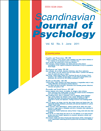Gender differences in subjective well-being, self-esteem and psychosocial functioning in adolescents with symptoms of anxiety and depression: Findings from the Nord-Trøndelag health study
Abstract
Derdikman-Eiron, R., Indredavik, M. S., Bratberg, G. H., Taraldsen, G., Bakken, I. J. & Colton, M. (2011). Gender differences in subjective well-being, self-esteem and psychosocial functioning in adolescents with symptoms of anxiety and depression: Findings from the Nord-Trøndelag health study. Scandinavian Journal of Psychology52, 261–267.
Gender differences in the prevalence of symptoms of anxiety and depression during adolescence are well documented. However, little attention has been given to differences in subjective well-being, self-esteem and psychosocial functioning between boys and girls with symptoms of anxiety and depression. The aim of this study was to investigate gender differences in the associations between such symptoms and subjective well-being, self-esteem, school functioning and social relations in adolescents. Data were taken from a major population-based Norwegian study, the Nord-Trøndelag Health study (HUNT), in which 8984 (91% of all invited) adolescents, aged 13–19 years, completed an extensive self-report questionnaire. Although prevalence rates of symptoms of anxiety and depression were higher in girls than in boys, a significant interaction between gender and symptoms of anxiety and depression was found in respect of each of the following outcome variables: subjective well-being, self-esteem, academic problems, frequency of meeting friends and the feeling of not having enough friends. These interactions indicate that the associations between symptoms of anxiety and depression and lower subjective well-being and self-esteem, more academic problems in school and lower social functioning were stronger for boys than for girls. Our findings may contribute to an earlier assessment and more efficient treatment of male adolescent anxiety and depression.




